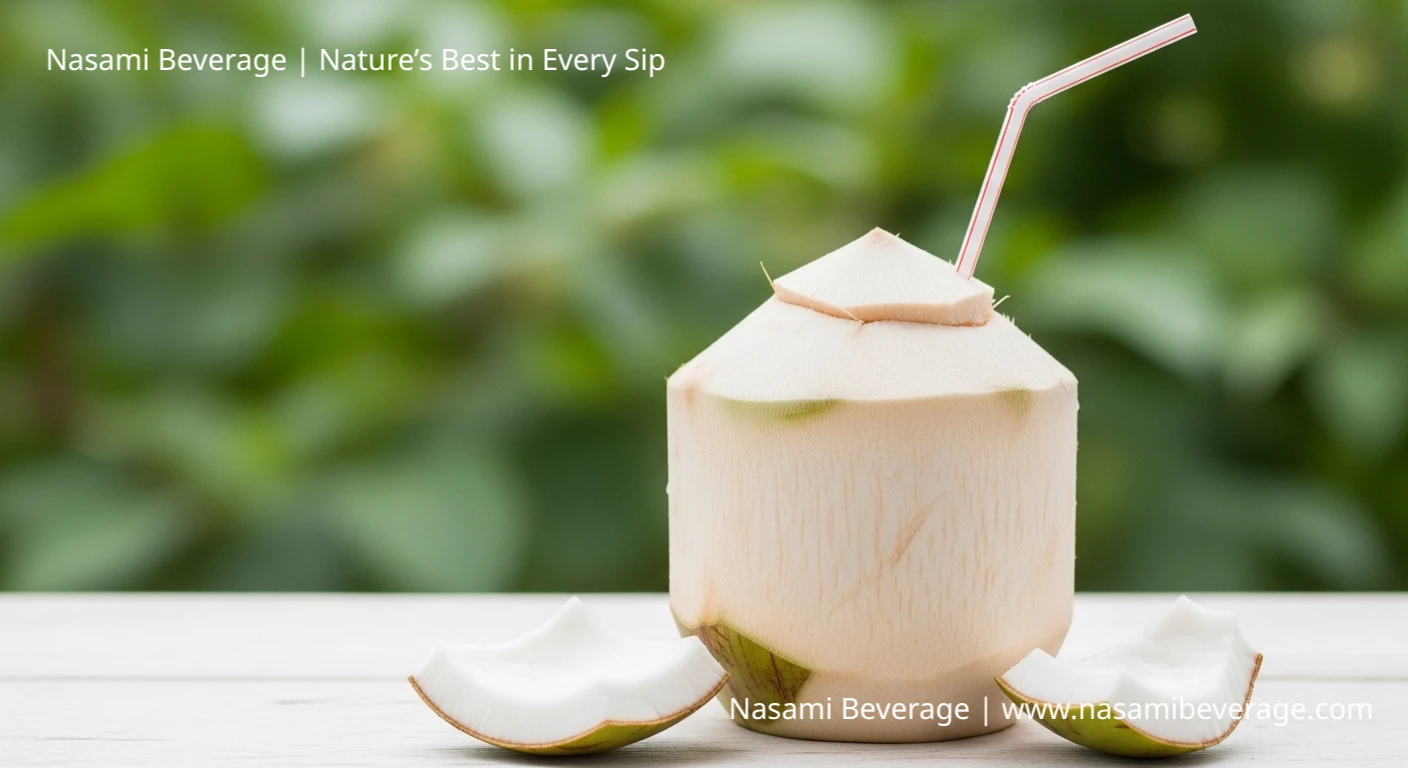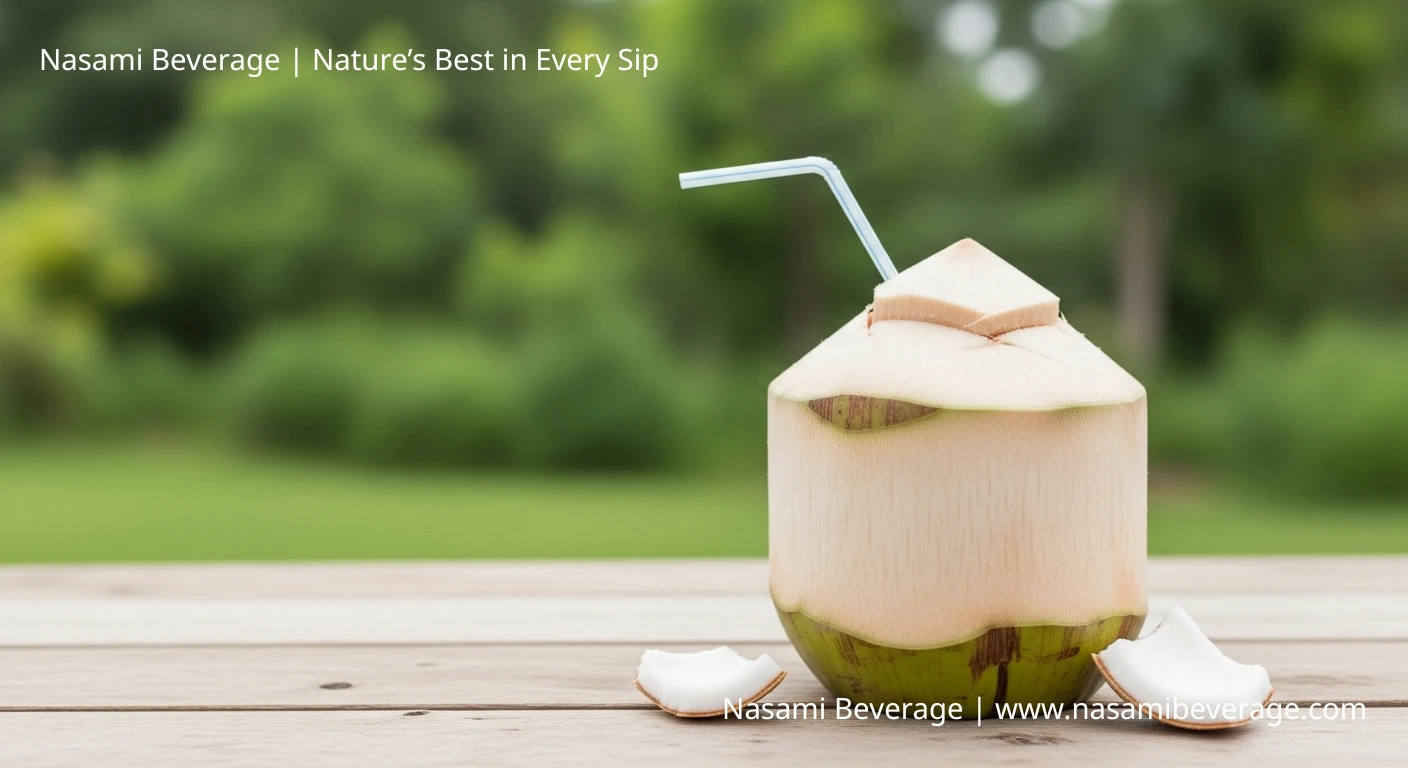Can babies have coconut water? Parents today are increasingly curious about natural hydration options for their little ones, sparking questions like, can babies have coconut water? This nutrient-packed beverage, celebrated for its electrolytes, has gained popularity among health-conscious families. However, its suitability for infants requires careful consideration. This article explores the safety, nutritional benefits, and potential risks of coconut water for babies. From age-appropriate guidelines to expert insights and practical serving tips, we aim to empower parents with clear, evidence-based advice to make informed decisions about their baby’s nutrition.
What is coconut water?
Coconut water is the clear, naturally sweet liquid found inside young green coconuts. Packed with essential nutrients, it serves as a hydrating powerhouse for adults and, in some cases, children. Its composition includes potassium, magnesium, vitamin C, and lauric acid, a fatty acid also present in breast milk.
Unlike formula or breast milk, coconut water is low in calories and fat, making it a unique addition to a baby’s diet when introduced correctly. Understanding its properties helps parents decide if it aligns with their infant’s nutritional needs.
Nutritional benefits for babies
Coconut water delivers a range of nutrients that support infant health. Potassium aids muscle function and heart health, while magnesium supports bone development. Vitamin C boosts immunity, and lauric acid promotes a healthy immune response, mimicking some benefits of breast milk.
These components make coconut water a potential ally for hydration and minor digestive support, particularly for babies over six months who have started solids.
How it differs from coconut milk
Coconut milk, derived from the grated flesh of mature coconuts, is high in fat and calories, making it less suitable for infants. In contrast, coconut water is light, low in fat, and naturally hydrating, with a nutrient profile better suited for babies when introduced at the right age. Parents must distinguish between these two to avoid digestive issues or nutritional imbalances in their infants.
Is coconut water safe for babies?
Coconut water can be safe for babies when offered at the appropriate age and in moderation. Pediatricians generally advise against giving it to newborns or infants under six months, as their digestive systems rely solely on breast milk or formula.
For older babies, coconut water poses minimal risks, though parents should monitor for rare allergic reactions or excessive potassium intake, which could lead to hyperkalemia. Consulting a pediatrician ensures it fits into a baby’s unique health profile.
Age guidelines for introducing coconut water
Babies under six months should exclusively consume breast milk or formula to meet their nutritional demands. Between six and eight months, when solids are introduced, small amounts of coconut water may be offered as a supplementary drink.
Toddlers over one year can tolerate larger servings, typically one to two ounces daily, depending on their diet and activity levels. Gradual introduction helps gauge tolerance and prevents digestive upset.
Risks to watch for
Though rare, allergic reactions to coconut water can occur, manifesting as rashes or stomach discomfort. Excessive consumption may elevate potassium levels, potentially causing hyperkalemia, a condition affecting heart rhythm.
Additionally, coconut water should never replace breast milk or formula, as it lacks the essential fats and proteins needed for early development. Parents must prioritize moderation and variety in their baby’s diet.
Benefits of coconut water for babies
Coconut water offers several advantages for babies, particularly in hydration and digestive health. Its natural electrolytes make it a valuable tool for maintaining fluid balance, especially during warm weather or mild illness. The presence of lauric acid supports immune function, while its gentle composition can soothe minor digestive issues.
Research, such as studies from PubMed, highlights its efficacy in rehydration for mild gastroenteritis, making it a natural alternative to some commercial solutions.
Hydration and electrolyte balance
Electrolytes like potassium and sodium in coconut water help replenish fluids lost during heat, play, or illness. For babies prone to mild dehydration, it serves as a natural rehydration option, often better tolerated than sugary sports drinks. Compared to pediatric rehydration solutions, coconut water provides a cleaner ingredient list, appealing to parents seeking organic choices.
Supporting digestive health
Coconut water’s mild nature can ease constipation or support recovery from diarrhea in babies. Its natural sugars and electrolytes promote gut motility without overwhelming sensitive stomachs.
While Ayurvedic traditions praise its digestive benefits, scientific evidence remains limited, so parents should use it as a complementary aid rather than a primary remedy.
How to introduce coconut water to babies
Introducing coconut water requires a thoughtful approach to ensure safety and enjoyment. Start with small sips, about half an ounce, for babies aged six to eight months. Fresh coconut water is ideal, but if using store-bought, check for no added sugars or preservatives.
Diluting it with water or mixing it into purees can make it easier for babies to digest. Always observe for adverse reactions during the first few servings and ensure the color of coconut water is clear to confirm freshness.
Choosing the right coconut water
Opt for fresh coconut water whenever possible, as it retains maximum nutrients and purity. Brands like Vita Coco or Harmless Harvest offer organic options, but parents must read labels to avoid artificial additives.
Single-ingredient products ensure babies receive only the natural benefits without unnecessary fillers that could upset their stomachs.
Serving suggestions
For young babies, mix coconut water into rice cereal or vegetable purees to enhance flavor and hydration. Toddlers can sip it from a cup, ideally in one- to two-ounce servings.
Chilling it slightly may make it more appealing, but avoid serving it too cold to prevent digestive discomfort. Creative combinations, like blending with mashed banana, can make it a nutritious treat.
Expert opinions and research
Pediatricians, such as Dr. Sylvia Echendu, caution against offering coconut water to newborns due to its insufficient caloric content for early growth. However, for older babies, experts endorse its use in moderation.
A PubMed study on coconut water’s role in treating gastroenteritis supports its rehydration benefits, aligning with recommendations from the American Academy of Pediatrics for natural hydration aids. These insights underscore the importance of timing and portion control.
Common myths about coconut water for babies
Several misconceptions surround coconut water’s role in infant nutrition. Some believe it can prevent colic or fully replace breast milk, both of which are unfounded. Coconut water is a supplementary drink, not a cure-all or substitute for essential nutrition.
Another myth suggests it’s necessary for all babies, but healthy infants on balanced diets may not need it. Clearing these myths helps parents make informed choices.
FAQs: Can babies have coconut water?
At what age can I give my baby coconut water?
Babies can typically have coconut water starting at six to eight months, alongside solids, in small amounts. Consult a pediatrician first.
Is coconut water better than water for baby hydration?
Coconut water provides electrolytes, making it more effective than plain water for rehydration during mild illness or heat, but it’s not a daily necessity.
Can coconut water cause allergies in babies?
Allergies are rare but possible. Introduce coconut water slowly and watch for rashes or digestive issues.
How much coconut water is safe for a toddler daily?
Toddlers can safely consume one to two ounces daily, depending on their diet and health, but moderation is key.
Coconut water can be a refreshing and nutritious addition to a baby’s diet when introduced thoughtfully. Safe for infants over six months in small amounts, it offers hydration, immune support, and digestive benefits. Parents should choose pure, organic options, monitor portions, and consult pediatricians to ensure it complements their baby’s needs.
By understanding its benefits and limitations, families can confidently explore this natural beverage with trusted brands like Nasami Beverage. For more tips on infant nutrition, check out our comprehensive guide to keeping your little one healthy and happy.



